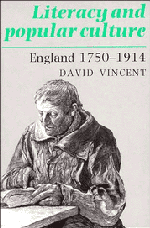Summary
This book is based on the premise that the consequences of the coming of mass literacy in England must be sought in the diverse areas of activity in which the skills of reading and writing were practised. It is argued that the often discrete categories of education, family, work, popular beliefs, the imagination and politics must be studied together, and that statistical data should be integrated with the many forms of literary evidence. As is ever the case, such objectives are easier to prescribe than implement. The research has taken me into unfamiliar areas of material and analysis, and for this reason I have been more than usually dependent on the advice and assistance of colleagues and friends at Keele and elsewhere.
I was helped in the construction of the sample of marriage registers and the use of computer facilities at Keele and the University of Manchester Regional Computer Centre by Alan Branthwaite, Paul Collis and David Sherwood. Alice Belcher, Peter Belcher, Nesta Evans and Charlotte Vincent shared with me the often agreeable task of visiting record offices and parish vestries in different parts of the country to abstract entries from the registers. The coding of over 30,000 occupations was undertaken by Michael Pearson Smith. This section of the research was supported by a grant from the Nuffield Foundation.
- Type
- Chapter
- Information
- Literacy and Popular CultureEngland 1750–1914, pp. xi - xiiPublisher: Cambridge University PressPrint publication year: 1989



